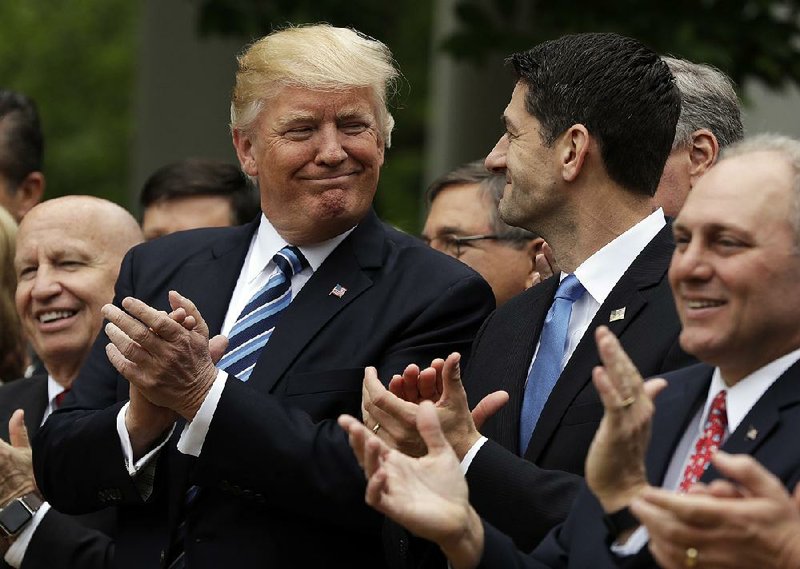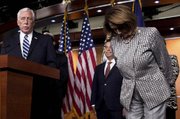WASHINGTON -- House Republicans voted Thursday to repeal and replace the Patient Protection and Affordable Care Act, overcoming united Democratic opposition and their own divisions, and claiming a major victory even as the measure faces an uncertain fate in the divided U.S. Senate.
The 217-213 vote was a narrow victory for the Republicans. After seven years of campaign promises and dozens of show votes, Republicans finally succeeded in passing a health care bill that, with a Republican president, has a chance of becoming law.
They didn't wait for the bill's final passage to celebrate.
"What a great group of people!" Trump exclaimed at the White House, arms raised to salute the dozens of lawmakers who hurried to join him in the Rose Garden immediately after the vote.
[INTERACTIVE: Compare new health care bill with Affordable Care Act]
The measure passed without an analysis from the Congressional Budget Office on its cost and impact on insurance coverage, and it did so after many Republicans openly acknowledged that they hadn't read the bill. Trump has promised "insurance for everybody," which the measure will not achieve.
Still, Trump touted the House's passage of the bill as a big step toward delivering on a key promise.
"Make no mistake, this is a repeal and a replace of 'Obamacare,' make no mistake about it," he said. "Premiums will be coming down, deductibles will be coming down, but very importantly it's a great plan."
Democrats countered that the GOP bill would have the opposite effect from what Trump predicted, pointing to estimates that it will kick millions of people off the insurance rolls while imperiling coverage for people with pre-existing conditions who had gained protections under Barack Obama's Affordable Care Act.
Before Thursday's vote, House Minority Leader Nancy Pelosi, D-Calif., noted that many Americans can't name their members of Congress, but voting for the bill would earn them voters' ire.
"You will glow in the dark on this one," Pelosi warned. "So don't walk the plank, especially unnecessarily."
As the vote closed on the House floor, Democrats jeered at Republicans with chants of "nah, nah, nah, nah, hey, hey, hey, goodbye" -- an echo of how protesters serenaded Democrats seven years ago when they passed Obama's bill.
The House bill would eliminate the fines Obama's law imposed on people who don't buy insurance coverage and shift power to states to set important health insurance rules. It would end the Affordable Care Act's subsidies for eligible people who buy health plans through marketplaces created under the law, creating and substituting new tax credits. The measure also would rescind several taxes that have helped pay for the law, including ones imposed on Americans with high incomes, and on health insurers, medical devices and tanning salons.
Among the bill's more contentious provisions is one that would allow states to let insurers return to their old practice of charging more to customers with pre-existing medical problems -- a practice that the current law prohibits.
The bill also would block federal payments to Planned Parenthood for a year, considered a triumph by many anti-abortion Republicans.
As lawmakers prepared to vote, House Speaker Paul Ryan told them: "Many of you have been waiting seven years to cast this vote. Many of you are here because you pledged to cast this vote."
Ryan withdrew an earlier version of the measure in March, after it became clear that he did not have the votes to pass it -- primarily because of strong opposition from the conservative House Freedom Caucus.
The White House had pushed hard for a vote, and Trump got personally involved in last-minute maneuvering. He helped get wavering moderates on board after a deal secured by conservatives last week scared them off by limiting protections for people with pre-existing conditions.
The final change, agreed to Wednesday at the White House, was to add $8 billion over five years to help people with pre-existing conditions, a sum critics called a relative pittance.
Protesters were on hand again for Thursday's vote, shouting "Shame on you! Shame on you!" and "2018! 2018!" as Republicans boarded buses outside the Capitol to head to the White House.
Indeed, despite assurances by GOP leaders that their legislation would rescue a failing health care system, it was opposed by nearly all medical and consumer groups, from the American Medical Association to AARP. The Chamber of Commerce supported the bill.
Arkansas' representatives
Members of the Arkansas congressional delegation all voted for the bill and released statements after Thursday's vote.
U.S. Rep. Bruce Westerman predicted that the legislation will continue to evolve once it reaches the Senate.
"This bill is not final, but instead the beginning of a process to repeal Obamacare and put in place conservative legislation that gives Americans freedom in health care," the Republican from Hot Springs said.
Constituents can expect to see "a repeal of Obamacare and a free market approach to health coverage," he said.
U.S. Rep. French Hill said the current law has led to soaring premiums and fewer options.
"The status quo is not working for Arkansas and not working for our country," the Republican from Little Rock said, adding that the measure passed Thursday would "lower the cost of care for individuals and families, provide coverage for those with pre-existing conditions, and shift power back to the states."
U.S. Rep. Rick Crawford said the legislation repeals the taxes and penalties implemented by the Affordable Care Act, gives states more flexibility and protects people with pre-existing conditions.
"I have concerns with the refundable tax credit, but this version of the AHCA does reduce entitlement spending and returns power to individuals, their families, and the states," the Republican from Jonesboro said.
U.S. Rep. Steve Womack called the vote "a huge step in repealing Obamacare," a law he has opposed since his first day in Congress.
"Since it was signed into law, Obamacare has drastically increased premiums across the country, placed burdensome mandates on our nation's small businesses, and forced families into situations that have created a patient-government relationship rather than a patient-physician relationship," he said.
The legislation, he said, will "bring about the changes that are deserved for all Arkansans."
At least two of the members, Westerman and Womack, went to the White House after the vote.
Prospects in the Senate
In the Senate -- where the bill heads next -- there remains widespread disagreement among Republicans about how to proceed on health care, and additional hurdles remain before the legislation can be considered.
First, the Senate's parliamentarian -- or rules keeper -- cannot review the legislation and determine the rules of debate until the Congressional Budget Office submits its official estimate, which could take several more weeks to complete, according to congressional aides. That would mean that official Senate debate on the bill could not begin until June.
A small group of GOP senators met Thursday morning in the office of Senate Majority Leader Mitch McConnell, R-Ky., to begin outlining their health care priorities, said Sen. John Cornyn, R-Texas, McConnell's top deputy.
But Cornyn declined to commit to a schedule for when the Senate will begin consideration of the House health care rewrite. "There is no timeline," he said. "When we get 51 senators, we'll vote."
But other senators made clear that the process would be more deliberative in the upper chamber of Congress.
"A bill -- finalized yesterday, has not been scored, amendments not allowed, and 3 hours' final debate -- should be viewed with caution," Sen. Lindsey Graham, R-S.C., tweeted Thursday before the House vote.
Republicans hold a 52-48 advantage over Democrats in the upper chamber, leaving GOP leaders with a narrower margin for error than in the House.
Senate Republicans have opted to use a maneuver known as reconciliation to try to pass the bill with a simple majority, instead of having to clear the 60-vote threshold that is required for most legislation. In the current balance of power, that would require Democratic votes. But even getting to a simple majority will be no small task.
GOP senators from states that have expanded Medicaid under the Affordable Care Act, such as Sen. Rob Portman of Ohio and Shelley Moore Capito of West Virginia, have voiced concerns about rollbacks to that program in the House bill.
When asked if she still has worries about cuts to Medicaid, Capito replied, "Absolutely."
Meanwhile, a trio of conservative senators -- Ted Cruz, R-Texas, Mike Lee, R-Utah, and Rand Paul, R-Ky. -- are wild cards. They have been willing to buck party leadership. Earlier this year, they pushed for a more aggressive repeal of the health care law than many of their colleagues favored.
"I think that the House Freedom Caucus was able to make the bill a lot less bad," Paul said. "I think there's still some fundamental problems that I have with it."
And Sens. Bill Cassidy, R-La., and Susan Collins, R-Maine, have already introduced an alternative plan, giving lawmakers a second measure to look at if talks fall apart over the current bill.
Even if Senate Republicans manage to pass their own version of a health care overhaul, it would then have to be reconciled with the House version.
Rep. Mark Meadows, R-N.C., chairman of the hard-right House Freedom Caucus that Paul referred to, said he would not necessarily back any changes made by the Senate.
"Obviously, the upper chamber has their own personalities and their own agendas," Meadows said. "Certainly, it's their agenda and not mine."
"If they revise it, there's no way," Rep. Dave Brat, R-Va., another Freedom Caucus member, said earlier this week.
Yet Trump on Thursday sounded optimistic.
"We're going to get this passed through the Senate -- I'm so confident," Trump said.
"This has really brought the Republican Party together," he added.
Information for this article was contributed by Ed O'Keefe, Paige Winfield Cunningham, Amy Goldstein, Sean Sullivan, David Weigel, Kelsey Snell, Robert Costa and Paul Kane of The Washington Post; by Frank Lockwood of the Arkansas-Democrat-Gazette; and by Erica Werner, Alan Fram, Mary Clare Jalonick, Kevin Freking, Stephen Ohlemacher and Andrew Taylor of The Associated Press.
A Section on 05/05/2017


